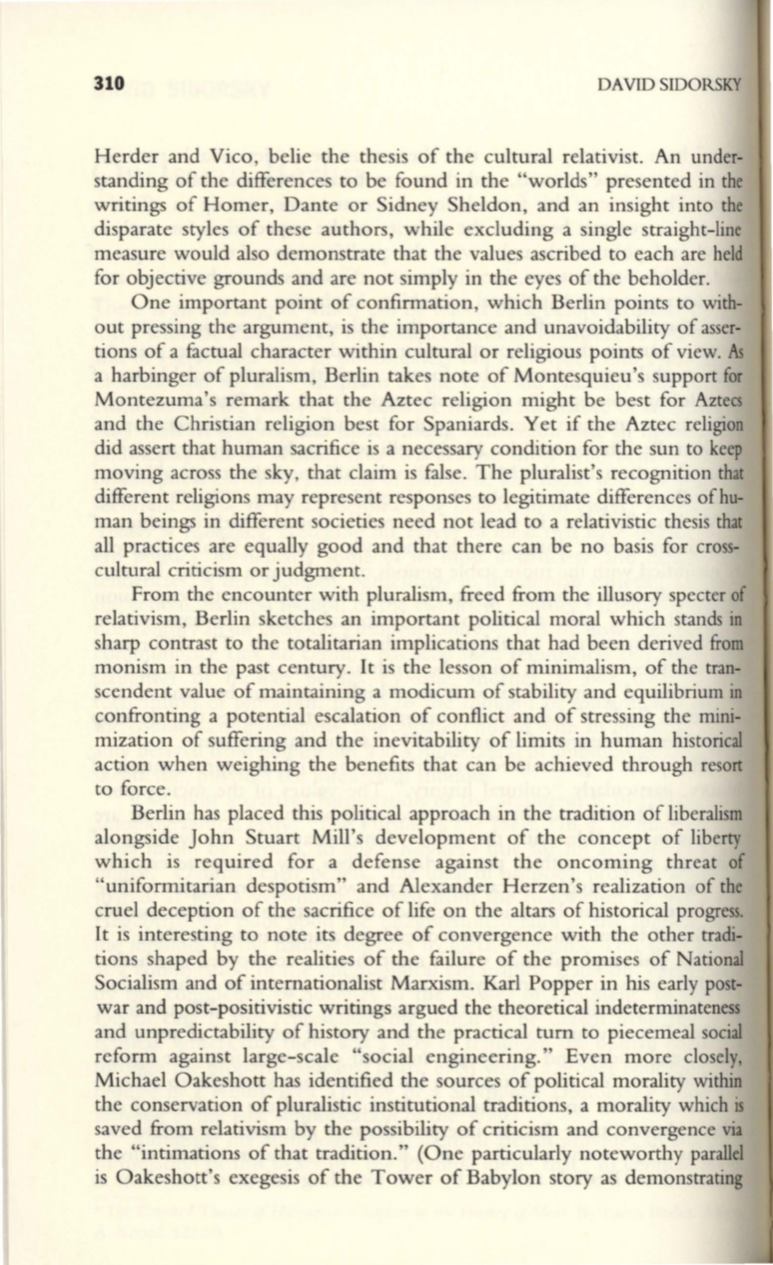
310
DAVID SIDORSKY
Herder and Vico, belie the thesis of the cultural relativist. An under–
standing of the differences to be found in the "worlds" presented in the
writings of Homer, Dante or Sidney Sheldon, and an insight into the
disparate styles of these authors, while excluding a single straight-line
measure would also demonstrate that the values ascribed to each are held
for objective grounds and are not simply in the eyes of the beholder.
One important point of confirmation, which Berlin points to with–
out pressing the argument, is the importance and unavoidability of asser–
tions of a factual character within cultural or religious points of view.
As
a harbinger of pluralism, Berlin takes note of Montesquieu's support for
Montezuma's remark that the Aztec religion might be best for Aztecs
and the Christian religion best for Spaniards. Yet if the Aztec religion
did assert that human sacrifice is a necessary condition for the sun to keep
moving across the sky, that claim is false. The pluralist's recognition that
different religions may represent responses to legitimate differences ofhu–
man beings in different societies need not lead to a relativistic thesis that
all practices are equally good and that there can be no basis for cross–
cultural criticism or judgment.
From the encounter with pluralism, freed from the illusory specter of
relativism, Berlin sketches an important political moral which stands in
sharp contrast to the totalitarian implications that had been derived from
monism in the past century. It is the lesson of minimalism, of the tran–
scendent value of maintaining a modicum of stability and equilibrium in
confronting a potential escalation of conflict and of stressing the mini–
mization of suffering and the inevitability of limits in human historical
action when weighing the benefits that can be achieved through resort
to force.
Berlin has placed this political approach in the tradition of liberalism
alongside John Stuart Mill's development of the concept of liberty
which is required for a defense against the oncoming threat of
"uniformitarian despotism" and Alexander Herzen's realization of the
cruel deception of the sacrifice of life on the altars of historical progress.
It
is interesting to note its degree of convergence with the other tradi–
tions shaped by the realities of the failure of the promises of National
Socialism and of internationalist Marxism. Karl Popper in his early post–
war and post-positivistic writings argued the theoretical indeterminateness
and unpredictability of history and the practical turn to piecemeal social
reform against large-scale "social engineering." Even more closely,
Michael Oakeshott has identified the sources of political morality within
the conservation of pluralistic institutional traditions, a morality which
is
saved from relativism by the possibility of criticism and convergence
via
the "intimations of that tradition." (One particularly noteworthy parallel
is Oakeshott's exegesis of the Tower of Babylon story as demonstrating


